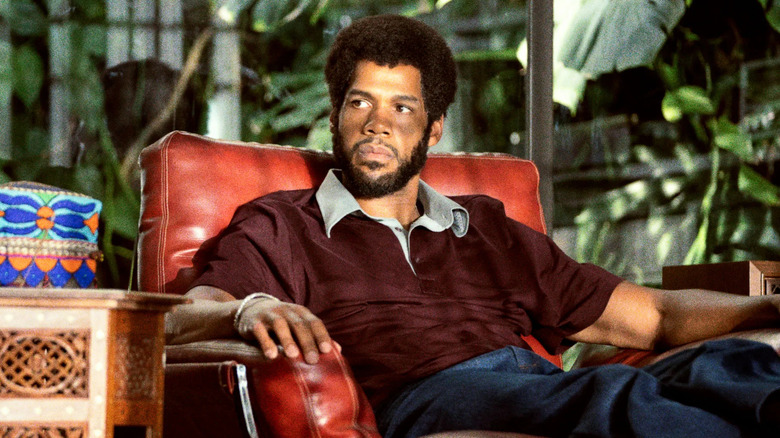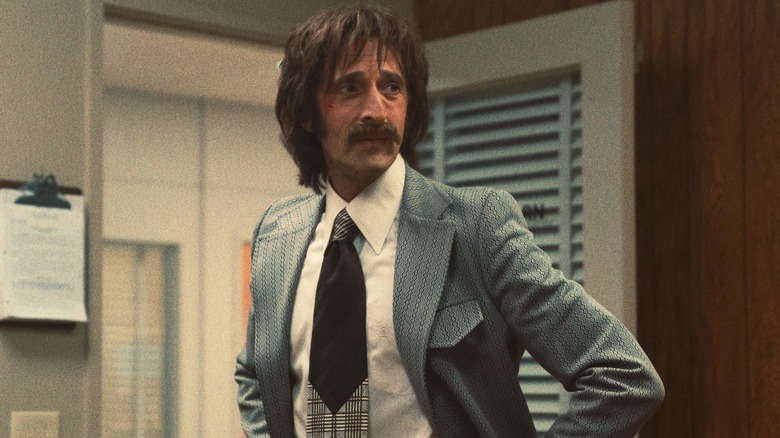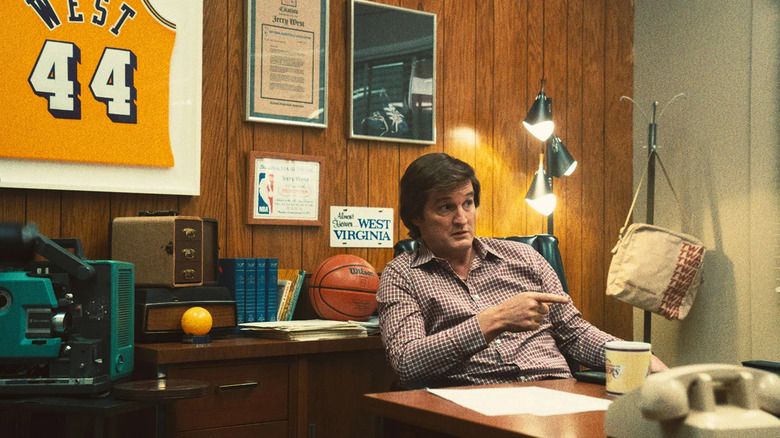Winning Time Cast Talks About Fatherhood, Contrasts, And Legacy [Interview]
"Winning Time: The Rise of the Lakers Dynasty" spends a substantial amount of time focusing on fatherhood, so it was fitting that on the show's press day, Adrien Brody (playing Pat Riley), Jason Clarke (playing Jerry West), and Solomon Hughes (playing Kareem Abdul-Jabbar) were grouped together when speaking to journalists. In "Winning Time" creator Max Borenstein's depiction of these athletes, their fathers loom large. As a kid, West was afraid of coming home to his abusive father. Riley's father, Leon, was a minor league ballplayer with dashed dreams; his shadow of regret hangs over Riley in the show. And in the latest episode of the HBO series, "Pieces of a Man," we see a portrayal of how Abdul-Jabbar relates and contrasts with his own father, Ferdinand Lewis Alcindor, Sr., who is a police officer.
The most recent episode of "Winning Time: The Rise of the Lakers Dynasty" emphasized one of the many running themes in the show. It asks questions but doesn't provide answers about fathers, but in our conversation, the three leads answered our questions about how they interpreted these relationships and their own feelings on fatherhood.
"Read about it"
Adrien, how'd you interpret Pat Riley's relationship with his father? What did you take away from it?
Brody: Well, I think our fathers are such a big part of our lives, whether they're there or not, or they've lived up to our hopes that they should be and we live up to our hopes of being the men that they expected us to be. I think it's a pretty universal thing and it affects most people.
Riley's father was a somewhat accomplished player. He was a ball player and really wanted to get a coaching management position and never quite got to that place. I think that had an effect on him. It was so important to him. He was just so determined, I feel like, that he couldn't let the obstacles that prevented his father's triumph do the same in his path. And they had similar aspirations. So I think it was a motivational tool for him in the end. It motivated him to step beyond that.
Solomon, the latest episode depicts Kareem Abdul-Jabbar's relationship with his father, showing some contrasts between them. How important was that relationship to you playing him?
Hughes: Like Adrien said, it's part of who we are as individuals, right? Again, whether our father was around or they're very present, just these figures that we are in so many ways. It's in some ways trying to emulate, trying to be different from, and I think when you think about Kareem's father, all the contradictions — a police officer, a Juilliard trained musician, right? Kareem has written about just how stoic his father was and just the lack of communication that was there.
Kareem talks about his love for reading comes from his father. Whenever he would ask his father a question, he would tell his son, "Read about it." Essentially go to the books. I mean, I can only imagine what it was like being a Black kid in the '60s and your father is a police officer. I feel like it speaks to Kareem navigating all of these seemingly contradictory things that are just happening in our world, this great country of America.
He lives in Harlem, when I believe it was James Powell is gunned down and riots ensue. Or just the impact that the church bombing of the four little girls that were killed in Birmingham, just the impact that had on Kareem as a young Black American. Kareem recently wrote an essay about it, talking about being the son of a police officer, and I highly recommend it.
"F***, you know?"
Jason, the Jerry in the show focuses more on the losses than the wins, and obviously is still struggling with his childhood. Based on your research, how did that upbringing shape how you wanted to play him?
Clarke: Jerry's well on the record about his relationship with his father. I mean, he threatened his father. It really strikes you what it means to lose, to really be beaten — not just to lose when the buzzer is gone and "Okay, we lost as a team," or "That was a rough thing there," but to be really beaten.
You'd see those pictures of Jerry, and it's like he had the sh*t beaten out of him. Like literally, somebody had just kept knocking him down until he couldn't get up anymore. He kept trying to get up until one day he couldn't, and he walked away. Jerry kind of finished his career a little bit earlier.
He probably could have played a little bit more, maybe not. He had a lot of injuries, and he played through a lot of injuries. There's his relationship with his father and his relationship with his brother that died at war. I love Jerry, his honesty with trying to pick his way through that.
Basketball gets you out of the dirt. It gives you a roof over your head. It gives you a focus when the world's exploding around you, or when you're in so much pain, you can't take it anymore. You just go and throw a ball against a board. It's cheap, and it's free. And out of that, you become good. Then you eventually need to find how to live, where I guess your father never had the opportunity to. He was a minor. He didn't have choice, and you work yourself towards a point of choice.
And then all of a sudden you can read books about history. You can read books about World War II and then the Korean War, understand his own brother's death within it and have questions and all that. I love Jerry's journey and his own journey then to being a father. It's integral to even this story and his treatment of Magic. There's a little scene where he admits that he's not a good father in this show. He doesn't think that he's a very good father.
It's the old father, son [dynamic]. It's Cat Stevens, it's everything, isn't it? F***, you know? It's there for us all. I'd love to read that essay, Solomon, about the policeman father as well. Even the father's journey within that. Yeah, what did he have to do to be a policeman?
All these things that you have, at some point in your life, you reflect back and you go, "Well, he wasn't just my father. He was a person." He had his own thing separate from his responsibilities to me.
And if you would've stayed chained to your father forever, well, that's your own fault in a way. On a personal level, I personally hope to be friends with my sons. You hope you get to the point to be friends with your father because everyone has choices. It's easy to sit back in retrospect.
"Winning Time: The Rise of the Lakers Dynasty" is now airing on HBO.


